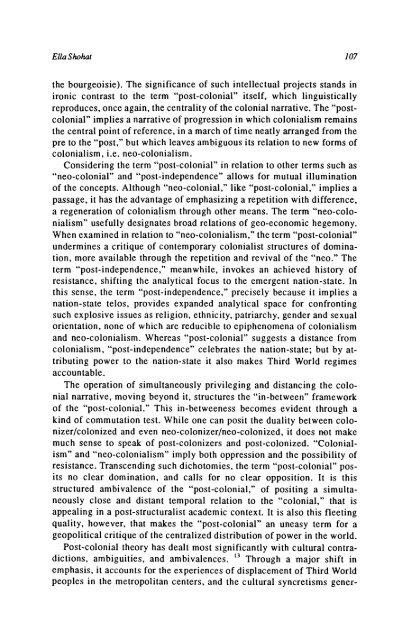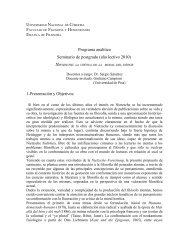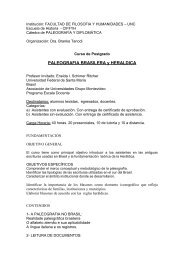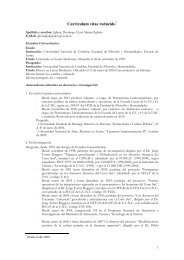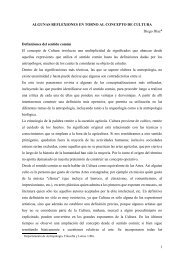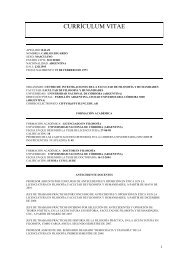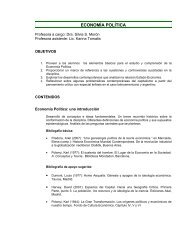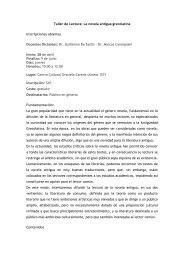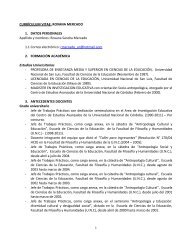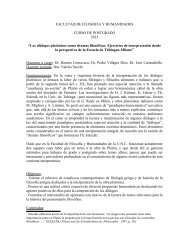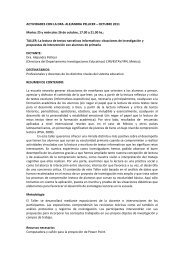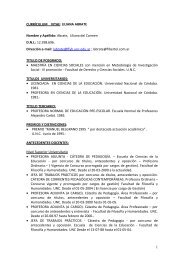Notes on the "Post-Colonial" Author(s): Ella Shohat Source: Social ...
Notes on the "Post-Colonial" Author(s): Ella Shohat Source: Social ...
Notes on the "Post-Colonial" Author(s): Ella Shohat Source: Social ...
You also want an ePaper? Increase the reach of your titles
YUMPU automatically turns print PDFs into web optimized ePapers that Google loves.
<strong>Ella</strong> <strong>Shohat</strong>107<strong>the</strong> bourgeoisie). The significance of such intellectual projects stands inir<strong>on</strong>ic c<strong>on</strong>trast to <strong>the</strong> term "post-col<strong>on</strong>ial" itself, which linguisticallyreproduces, <strong>on</strong>ce again, <strong>the</strong> centrality of <strong>the</strong> col<strong>on</strong>ial narrative. The "postcol<strong>on</strong>ial"implies a narrative of progressi<strong>on</strong> in which col<strong>on</strong>ialism remains<strong>the</strong> central point of reference, in a march of time neatly arranged from <strong>the</strong>pre to <strong>the</strong> "post," but which leaves ambiguous its relati<strong>on</strong> to new forms ofcol<strong>on</strong>ialism, i.e. neo-col<strong>on</strong>ialism.C<strong>on</strong>sidering <strong>the</strong> term "post-col<strong>on</strong>ial" in relati<strong>on</strong> to o<strong>the</strong>r terms such as"neo-col<strong>on</strong>ial" and "post-independence" allows for mutual illuminati<strong>on</strong>of <strong>the</strong> c<strong>on</strong>cepts. Although "neo-col<strong>on</strong>ial," like "post-col<strong>on</strong>ial," implies apassage, it has <strong>the</strong> advantage of emphasizing a repetiti<strong>on</strong> with difference,a regenerati<strong>on</strong> of col<strong>on</strong>ialism through o<strong>the</strong>r means. The term "neo-col<strong>on</strong>ialism"usefully designates broad relati<strong>on</strong>s of geo-ec<strong>on</strong>omic hegem<strong>on</strong>y.When examined in relati<strong>on</strong> to "neo-col<strong>on</strong>ialism," <strong>the</strong> term "post-col<strong>on</strong>ial"undermines a critique of c<strong>on</strong>temporary col<strong>on</strong>ialist structures of dominati<strong>on</strong>,more available through <strong>the</strong> repetiti<strong>on</strong> and revival of <strong>the</strong> "neo." Theterm "post-independence," meanwhile, invokes an achieved history ofresistance, shifting <strong>the</strong> analytical focus to <strong>the</strong> emergent nati<strong>on</strong>-state. Inthis sense, <strong>the</strong> term "post-independence," precisely because it implies anati<strong>on</strong>-state telos, provides expanded analytical space for c<strong>on</strong>fr<strong>on</strong>tingsuch explosive issues as religi<strong>on</strong>, ethnicity, patriarchy, gender and sexualorientati<strong>on</strong>, n<strong>on</strong>e of which are reducible to epiphenomena of col<strong>on</strong>ialismand neo-col<strong>on</strong>ialism. Whereas "post-col<strong>on</strong>ial" suggests a distance fromcol<strong>on</strong>ialism, "post-independence" celebrates <strong>the</strong> nati<strong>on</strong>-state; but by attributingpower to <strong>the</strong> nati<strong>on</strong>-state it also makes Third World regimesaccountable.The operati<strong>on</strong> of simultaneously privileging and distancing <strong>the</strong> col<strong>on</strong>ialnarrative, moving bey<strong>on</strong>d it, structures <strong>the</strong> "in-between" frameworkof <strong>the</strong> "post-col<strong>on</strong>ial." This in-betweeness becomes evident through akind of commutati<strong>on</strong> test. While <strong>on</strong>e can posit <strong>the</strong> duality between col<strong>on</strong>izer/col<strong>on</strong>izedand even neo-col<strong>on</strong>izer/neo-col<strong>on</strong>ized, it does not makemuch sense to speak of post-col<strong>on</strong>izers and post-col<strong>on</strong>ized. "Col<strong>on</strong>ialism"and "neo-col<strong>on</strong>ialism" imply both oppressi<strong>on</strong> and <strong>the</strong> possibility ofresistance. Transcending such dichotomies, <strong>the</strong> term "post-col<strong>on</strong>ial" positsno clear dominati<strong>on</strong>, and calls for no clear oppositi<strong>on</strong>. It is thisstructured ambivalence of <strong>the</strong> "post-col<strong>on</strong>ial," of positing a simultaneouslyclose and distant temporal relati<strong>on</strong> to <strong>the</strong> "col<strong>on</strong>ial," that isappealing in a post-structuralist academic c<strong>on</strong>text. It is also this fleetingquality, however, that makes <strong>the</strong> "post-col<strong>on</strong>ial" an uneasy term for ageopolitical critique of <strong>the</strong> centralized distributi<strong>on</strong> of power in <strong>the</strong> world.<strong>Post</strong>-col<strong>on</strong>ial <strong>the</strong>ory has dealt most significantly with cultural c<strong>on</strong>tradicti<strong>on</strong>s,ambiguities, and ambivalences. 13 Through a major shift inemphasis, it accounts for <strong>the</strong> experiences of displacement of Third Worldpeoples in <strong>the</strong> metropolitan centers, and <strong>the</strong> cultural syncretisms gener-


